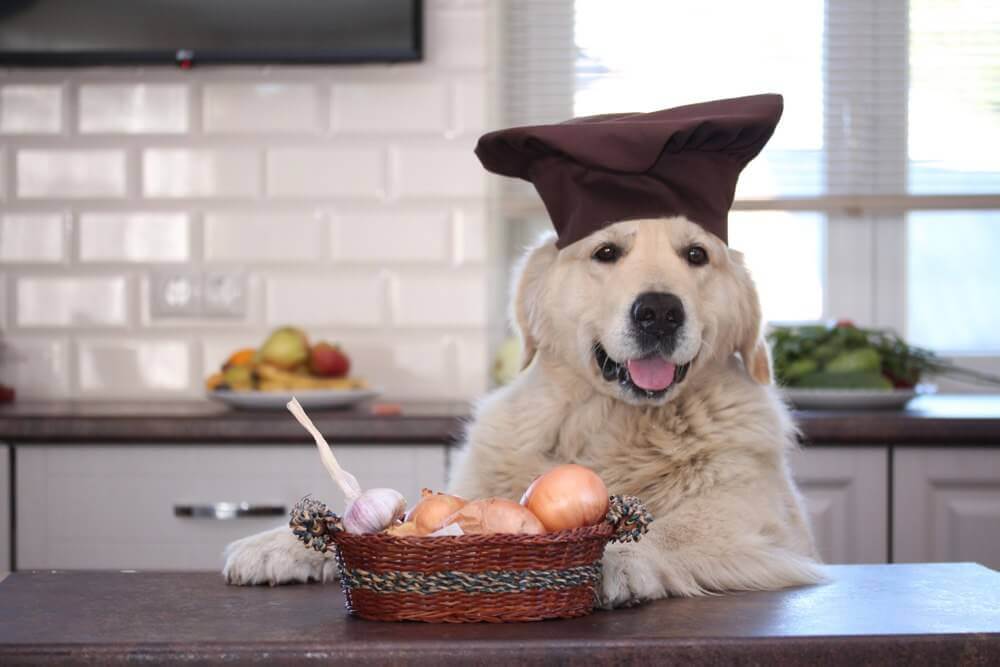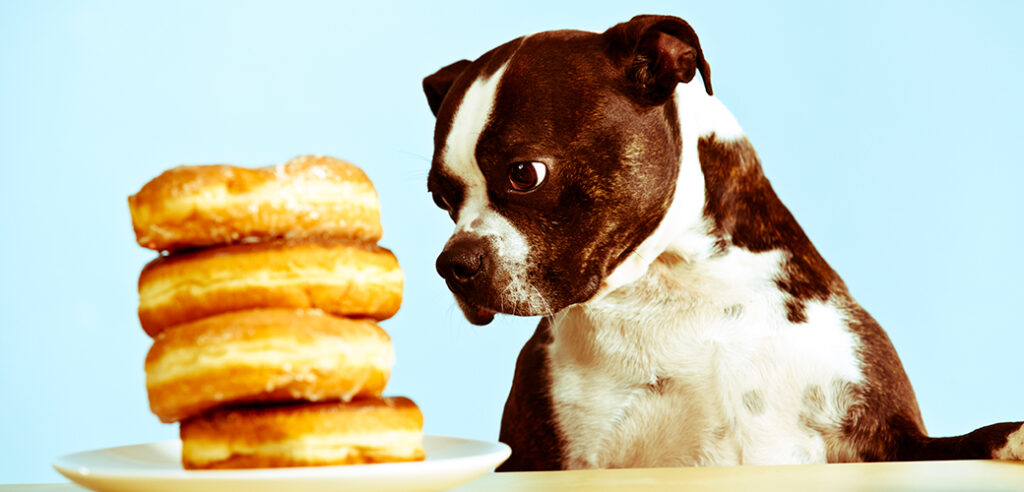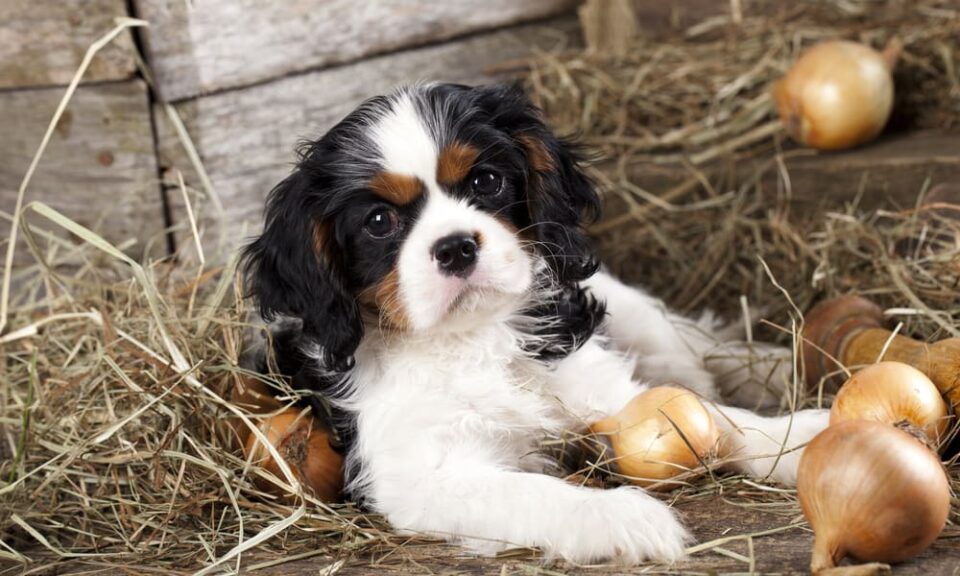If you’ve been trying to shift your dog to a more natural diet, there’s a chance you’re reading about the ingredients that are safe for them and the ones that aren’t. And while humans seemingly put onions on everything, this is an ingredient that’s very dangerous for dogs.
Whether you have onion rings, a burger with caramelized onions, or plain onion plants in your garden, you want to keep your dog away from it.
The onion plant is very dangerous for your pet and can lead to conditions like hemolytic anemia.
Nonetheless, if it’s so dangerous for dogs, why can humans eat it without any worries?
Well, this has to do a lot with biology and the actual composition of onions and other members of its plant family. And don’t worry, to help you understand why you should avoid putting this food in your dog’s meal, we’ve made a comprehensive guide.
In this article, we’re looking at why onions are toxic to dogs, why humans can eat onions, and some other common human foods that you may not know are toxic to your pets.
Read on to learn more.
What Makes Onions Toxic to Dogs?
Onions are toxic for dogs. The main reason for this is that onions contain something called thiosulfates. These are a naturally occurring compound in onions, garlic, chives, shallots, and all allium family members. And while humans can easily digest and process this compound when they eat onions, dogs aren’t as lucky.
Thiosulfates attack a dog’s red blood cells, which are responsible for distributing oxygen throughout the body. So, if your dog’s red blood cells aren’t functioning properly, this can lead to a lot of problems.
On top of that, you can find thiosulfate in all parts of the onion. Whether it’s the skin, the bulb, or the stems and leaves of the plant, thiosulfate is present. Therefore, if you have a couple of onion and garlic plants in your garden, we recommend finding ways to protect your dog from that area and keep them away.
What Happens When a Dog Eats Onions?

Many things can happen if your dog eats onions. Granted, they would have to it a fair amount to start actually feeling the symptoms of onion poisoning, but we don’t recommend risking it.
One of the first ways onion poisoning can manifest itself in dogs is through an upset stomach. If your dog starts vomiting, feeling lethargic, and showing other signs of food poisoning, it’s best to check if they accidentally ate onions or garlic.
However, in severe cases, dogs can develop even worse symptoms. For example, dogs can collapse, start drooling, lose their appetite, or produce reddish-colored urine after eating too many onions. This is why if you suspect that your dog is suffering from onion poisoning, contact your vet right away so you can learn what you need to do.
And in the absolute worst cases, your dog could even develop hemolytic anemia, especially if they eat a lot of onions regularly.
We all want to prioritize our dog’s safety. So, while giving them some onions may seem convenient, this is a very bad idea that could potentially jeopardize your dog’s health.
Why Can Humans Eat Onions But Dogs Can’t?
The reason we humans can eat onions, but dogs aren’t as lucky is down to biology. Humans and dogs are very different animals with different systems in place. This is why there are tons of human foods that are dangerous and toxic for dogs and why you shouldn’t go ahead and feed your dog everything in your kitchen.
Thiosulfates are very dangerous for dogs. They can do significant harm and damage to their red blood cells and is the reason you want to avoid feeding onions to your dogs as much as possible.
But on the flip side, our bodies can easily handle thiosulfate. This is a great example of food being great for humans but bad for dogs. This should also be a lesson for dog owners that it doesn’t mean you can feed them to your pets just because you can eat them.
What Are Other Common Human Foods Toxic for Dogs?

So, are onions and garlic the only human foods you should keep away from your dogs?
Far from it. There are tons of human foods that are bad for dogs, and we’ll be going through some of the most common ones in this section. That way, you can ensure that everything you feed your dog is safe for them.
Chocolate
This is one of the most popular human foods that people know are toxic to dogs. Chocolate contains a compound called theobromine, a stimulant their body can’t handle. On top of that, commercial chocolate contains a lot of sugar and caffeine, which can cause severe complications for your dog.
Artificial Sweetener
Many humans are trying to reduce their sugar intake. And to do this, they use artificial sweeteners like xylitol. While it may be a way for you to live healthier, artificial sweeteners are definitely not for your dog. These can be very toxic for them and be kept away from your pet at all costs.
Alcohol
Many of us enjoy the occasional drink to unwind. And while alcohol helps us loosen up and have a good time, it’s a completely different story for dogs. Alcohol is very toxic to dogs, and since they are much smaller than humans, it takes a much smaller amount for them to develop alcohol poisoning.
Grapes & Raisins
Lastly, we must highlight grapes and raisins. These are a special entry as scientists aren’t exactly sure why grapes and raisins are toxic for dogs. However, what we know right now is they can cause a lot of trouble for dogs, and they are best avoided.
What to Do If Your Dog Eats Onions

If you catch your dog eating onions, your first step should be to stop them. From there, keep the onions as far away from them and observe your dog.
If you find your dog developing any of the above symptoms, call your vet right away.

